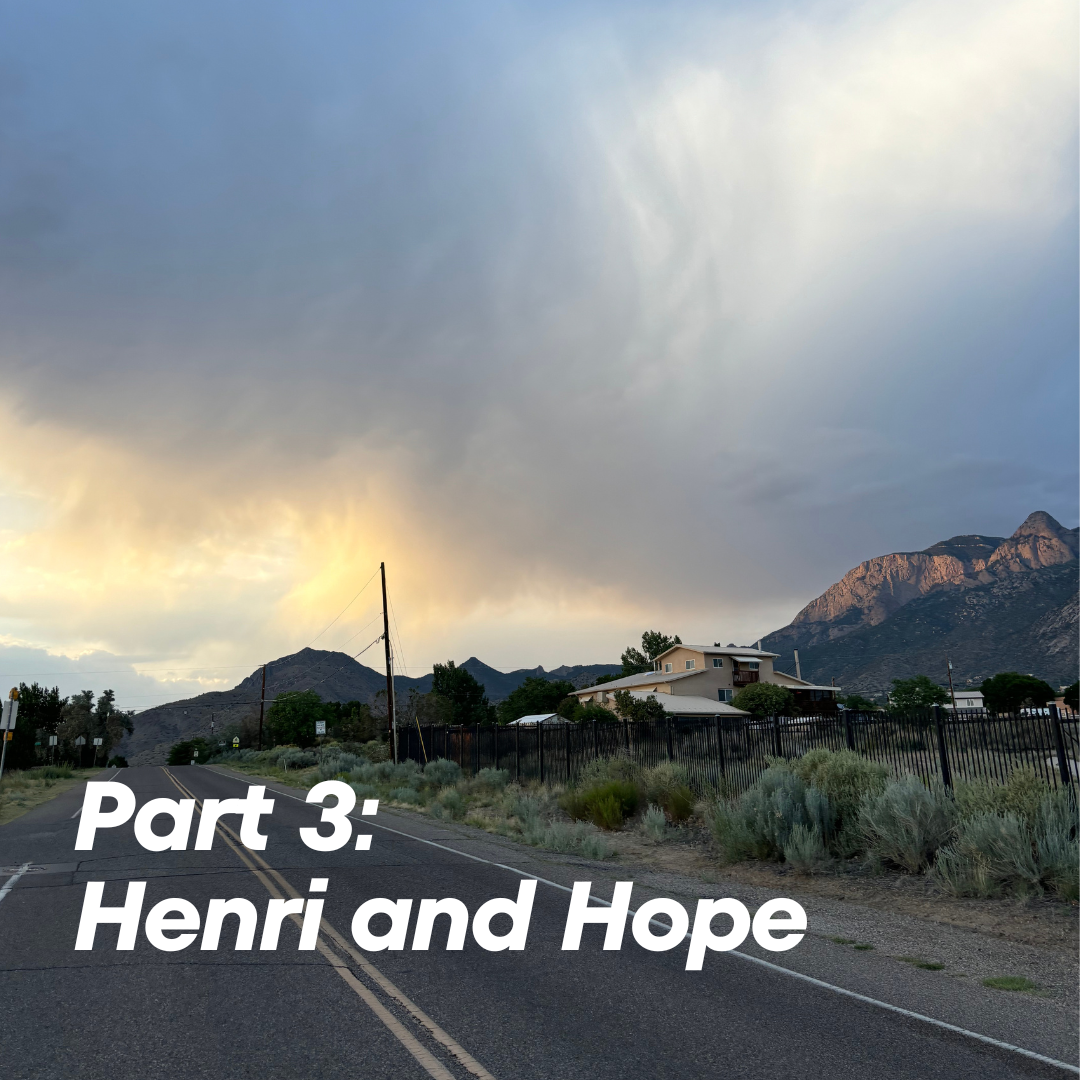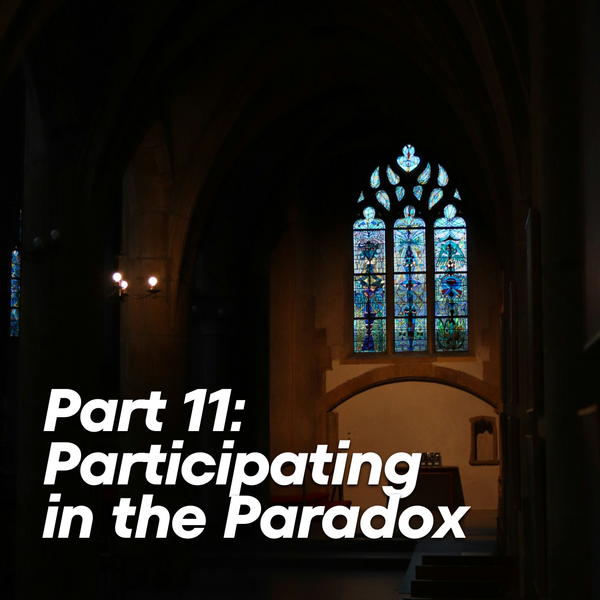Part 3: Henri and Hope

Doubt is the friend of questions,
and doubt is the teacher of truth.
— Padrig O'Tauma
And the day came when the risk to remain tight in a bud was more painful than the risk it took to blossom.
— Anaïs Nin
I remember exactly where I was when I finished Michael Ford’s 1999 biography of Henri Nouwen, Wounded Prophet - the second biography I had read about this world-renowned Dutch Catholic Priest, spiritual author, psychologist, and academic.
I was sitting on a plane flying to Los Angeles, California, to spend a week with my friends.
As I finished the biography an enormous well of emotion was tapped into and I couldn’t help but cry. In a completely unexpected way, I shut the book and with no success of holding back tears, I publicly broke down, undoubtably to the discomfort of the strangers around me.
This was not the kind of cry I was so familiar with in moments of late-night hopelessness and self-hatred; no, this was a cry of a different variety.
It was a cry of hope, of release, of profound consolation.
My journal entry from that day reads:
“I just finished Wounded Prophet, a biography about Henri Nouwen. When I started this book, I had no conception of how much Henri’s life was going to affect me.… I somehow feel as though I now have permission to exist: I feel seen, understood, validated, and represented. I have found solace and solidarity in Nouwen’s journey and life… Never has the life of another human enraptured my life’s vision and affected me so deeply.”
Why?
Well, if you didn’t know, Henri Nouwen was gay.
Not only was this a man who was not-heterosexual living a faithful Christian life, but he had also lived an exemplary one — one by which millions of Christians (and non-Christians) around the world had been blessed and nourished by.
It was the first time I had ever seen such representation, and Nouwen’s life somehow told me I was allowed to exist in the way I did and to experience God in the ways I had.
I remember being so curious to know how Henri had seemingly “reconciled” his faith and his sexuality, thinking to myself, “Maybe Henri could offer me some answers” — maybe he could help me find the reconciliation and peace I was so desperate for.
It was for that reason that, shortly after returning from my monastic retreat in the mountains, I was reminded of Henri’s evidential personal integration.
Upon my return from the monastery, it was time to make my decision official and to begin the announcements...
I told my family.
I called my friends.
I notified the country directors in Germany.
“Good news, I will be joining your team and returning to the mission field!”
I felt energized by my newfound sense of direction. There was much to consider and work on, such as finding a “sending church” and creating a fundraising plan, not to mention lots of administration to complete.
Then, on a Zoom call with the country directors, we announced my exciting decision to the whole team based in Germany.
But then something unexpected happened.
As soon as the Zoom call ended, I had what would be one of my first anxiety attacks ever.
Panic seemed to suddenly course through my veins, my vision narrowed, my chest got tight, my throat constricted, and I had an emotional flashback to being trapped back inside some religious organization and trapped doing ministry within a theological framework that required such unyielding devotion and self-suppression.
Looking back now, I see that my body was somehow literally rejecting and resisting this decision, almost as a way of trying to communicate to me that it was not safe or right. But I was far too disconnected from my body at the time, however, to make any sense of such a message.
It just felt like chaos.
And I was so confused.
Hours and days and weeks had gone into this decision, why did I feel this way?
My mother, seeing I was in distress after the call, suggested that we get some air.
I remember processing my post-announcement anxiety attack with her on a walk around the neighborhood.

I remember her asking, “I wonder if going to Germany for two years won’t just postpone the real work you already know you need to do?”
She wondered with me whether or not, after two years of serving in Germany, I wouldn’t be in the exact same position I was currently in but perhaps even more religiously and spiritually devastated than I already was, wrestling with the same questions that I was already grappling with.
She was right, I realized.
But I was so afraid.
I was so terrified of what answers I might find to the questions that lurked within me.
I didn’t want to lose my faith.
I didn’t want to lose God.
But did it have to be at the price of my peace?
Regardless of how confused my mind was as I considered the options, my body, like a prophet, told me an inconvenient truth.
Evidenced best by my anxiety attack, it did not lie to me: I could not push this aside any longer.
Something had to change.
I could not manufacture some kind of unquestioned submission to a worldview that had done such overt violence to me.
It might kill me if I did.
Searching for some kind of courage, some kind of clarity, some kind of direction of what to do in the precarity of my position, I was reminded of Henri Nouwen and the tears of consolation I had shed once upon a time reading his biography.
Somehow, he seemed to have already found the peace I was searching for.
Like a beacon of light, he signified that maybe there was hope.

Perhaps my faith and my sexuality did not have to be mutually exclusive.
Perhaps it was not a matter of either my sexuality or my faith, but perhaps there was a third way.
Curious to know more about this peace he seemed to hold, I began investigating more of his writing and life. It wasn’t long before I encountered a chapter in his book Intimacy about the stages of religious and spiritual development.
Speaking about our inner conflicts, he wrote:
Perhaps we touch here one of the most important crossroads of our religious development. The question is: can we accept and understand our inner conflicts in such a way that by clarification and understanding, they become a source of maturation of our religious [and spiritual] sentiment? [1]
This seemed to confirm my own growing intuition about the spiritual path that maybe my inner conflict was not something to “overcome” in my pursuit of God, but perhaps, when understood correctly, a vehicle for greater union and connection with him.
Helpfully, he outlined a couple of options we are presented with when we encounter our inner conflicts on the path to religious maturation:
First, he said, we can reject and rebel against our religion. He said:
We might feel that religion was so oppressive and depressive, so far away from our experience, so authoritarian and negativistic that the only way of resolving the conflict was to break away from it.[2]
Second, we can repress our conflict for the sake of maintaining our religiosity. He continues:
There is another reaction, perhaps more harmful. This is the tendency to deny and repress drastically the other side, the dark wishes, the unwelcome shadow…. We want to stay in complete control of ourselves, never have an evil thought, never curse, never get drunk, never fail, but always remain perfect, saintly, and, in a way, so self-contented that we don’t leave anything to God to be saved. We walk through life as if we had swallowed an easter candle, rigid and tense, always afraid that things will get out of hand.[3]
Or the third option, we can do the difficult inner work of acceptance and integration:
There is a way to maturity in which we say, ‘Sure, I have weak spots, but that does not make me weak. I have ugly thoughts, but that does not make me ugly.’ This is the realization that we have to tolerate the weeds in order to have good wheat. If we try and eradicate all the weeds, we might pull out the precious wheat…. To come to an inner unity, totality, and wholeness, every part of our self should be accepted and integrated..[4]
I read and reread this.
If I wanted to come to inner unity, totality, and wholeness, I needed to do the work of accepting and integrating every part of myself.
I didn’t know how to undertake this task, or what it meant, or how to possibly begin - but I knew it was true.
In the most timely manner, Henri’s wisdom instructed me, just like my mother’s question had, of what I knew I needed to do: “The conflict is obvious, the solution is not rebellion nor repression, but integration.”
With such an understanding, suddenly, the three options before me took on new lucidity.
Going back to Germany for two years would be an act of repression, as Henri understood it. Muscling piety as a means to repress myself. This was the option I was most familiar with, but as my body had told me — perhaps the most dangerous.
Pursuing a Master of Social Work was viable — but perhaps it was, as Henri understood it, an act of rejecting my religion by way of neglecting the work of really reconciling myself with it. How inconvenient it was that my faith still meant so much to me despite having been so abused by it.
Integration was the only way.
It seemed then, the only real question was: could I be brave?
Again Henri’s wise instruction was near to me when he wrote:
The question is, whether or not we have the courage to put question marks behind many things; if we can allow ourselves to doubt without loosing all grounds. Only he who feels safe in this world can take risks, only he who has a basic trust in the value of life is free to ask many questions without being threatened. Trust creates the possibility of a religion of search, which makes a commitment possible without certainty.[5]
Perhaps this was the ultimate test of my faith.
Could I trust God’s unconditional love to sustain me in my search?
Could I trust God to remain present to me, not despite my doubt, but because of it?
Bolstered by the instruction and experience of my spiritual mentor, Henri, it became clear that going to the Netherlands to pursue a master's in theology afforded me an ideal opportunity to confront these questions, begin addressing my great inner conflict, and begin my work of integration.
I wrote in my journal that summer:
It is no secret anymore that I am endeavoring to make sense of my queerness and to courageously integrate my queer experience into my self-understanding. It is disorienting to be in such a position, but yet I am sensing the sacred nature of such work. Its a space of congruency, of self-honesty, and of courage. It is the space, I wonder, that God has been wanting to meet me within the most.
And with that, I booked a one-way plane ticket to Europe.
This Post's Song: Rise, by Arelius
If you are finding this story insightful, engaging, or helpful, consider sharing it. You can also find Yielding to Yes on Instagram.
Read the next part:







